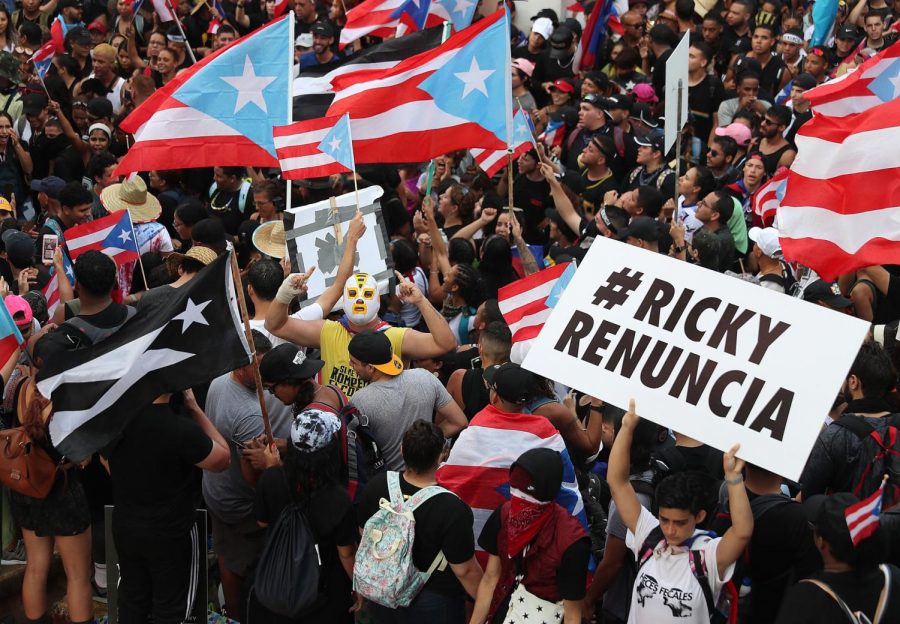Puerto Rico as a Case Study: Student/faculty collaboration for GV’s seventh annual Teach-In
The anti-corruption protests that featured heavily in the Teach-In session “¡Ave Maria! Puerto Rico as a Case Study in Disaster Capitalism.” Courtesy / Joe Raedle, Getty Images
Nov 11, 2019
On Thursday, Nov. 7, student Ricardo Zarkani stood at the front of Kirkhof meeting room with his three faculty teammates, Professors Melba Vélez Ortiz, Dennis Malaret and John Bender. The room was filled with a lot more people than he was expecting to show up for an optional 8:30 a.m. presentation, especially considering the three other presentations occurring in the same building at the time. But that kind of busy schedule is par for the course when it comes to the annual Teach-In.
This year’s Teach-In, named Power, Privilege and Difficult Dialogues, continued the program’s tradition of educating the Grand Valley State University community – students, faculty and staff – on topics related to inequality and systems of oppression.
“The GVSU Teach-In gives everyone a place to just talk about these challenging issues, making up for institutional contexts where that usually is not possible without considerable prior preparation,” said Bender, Chair of the Equity and Inclusion Committee. “Social Justice Awareness amongst the GVSU Student Community is the primary goal of the Teach-In, and in this regard, the event has evolved over time to become a staple of student engagement, excitement, and participation at GVSU. Although each Teach-In session is typically themed around a specific issue, presentation teams themselves are required to bring a diversity of perspectives, through the requirement of student-faculty/staff collaboration. ”
The first Teach-In was motivated by troubling responses to the 2011 Campus Climate Survey, as well as reports of bias incidents on campus, not just between students but in the classroom and between faculty. Seven Teach-Ins later, the event has become a two day long presentation featuring forty-five different sessions, with topics varying from “Urban Survival Skills for New Teachers” to “Confronting the Bias in Nursing Education” to “GVSU Through the Lens of Black Man.”
“My colleagues Melba, John, and Ricardo contacted me about putting a panel to talk about Puerto Rico at the Teach-In 2019,” said Malaret on the topic of their own session. “It took me less than 30 seconds to reply with the potential topic on ‘Disaster Capitalism, the Shock Doctrine, and the Commodification of Puerto Rican Culture.’”
Their presentation, officially titled ¡Ave Maria! Puerto Rico as a Case Study in Disaster Capitalism, examined how corporations took advantage of the human suffering in the aftermath of Hurricane Maria to profit off of “relief” efforts, enabled by corruption in the Puerto Rican government.
“Out of this tremendous sense of frustration and helplessness that people feel when corporations come down and try to make as much profit as they can from tragedy, Puerto Ricans were very creative in how they expressed that frustration,” said Vélez Ortiz during the presentation. “Not only did they protest, but they managed to do so in many engaging ways.”
Many of these protests were targeted against Governor Ricardo Rosselló, whose corruption became exceedingly obvious to the Puerto Rican public after a leak of disturbing private communication between him and other government officials that made light of the massive loss of human life brought on by the hurricane.
“You go to the protests with a group of friends and you see thousands of people who want the same things that you want,” said Zarkani, who had returned to Puerto Rico during the protests. “Being united as a people, as a city – it was an incredible experience. We had to leave out a lot of details about the protests for time, but there were jet-skis, boats, horses, thousands of motorcycles and miles of trucks honking. When people were being attacked by tear gas and rubber bullets, they made a line of trash cans and lit them on fire so the police couldn’t reach them. The intensity and the adrenaline that these things caused – you could get tear gassed and still be protesting.”
This wasn’t the first year that Zarkani and his faculty collaborators worked together on a Teach-In focused on Puerto Rico. Last year they also presented on the devastation of Hurricane Maria, but Zarkani was eager to approach the subject with them again after the #RickyRenuncia campaign this summer.
“I have a special connection with these professors, because at the moment of the hurricane they really stood up for me,” said Zarkani. “When the hurricane struck, I no longer had the money that my dad sent me from Puerto Rico – but they got together and went in on a meal plan for me. That was the craziest thing that could happen to me in college. Since then I’ve always been willing to work with them, and it was an honor for me to help them give this presentation. I’m in Michigan, so I definitely have to represent. I’m proud of where I’m from, I could talk about it all day.”
Sadly, this year’s Teach-In only allowed Zarkani to talk about Puerto Rico for 75 minutes, not all day, but he’s excited about the potential to do it again at next year’s Teach-In. So is Malaret, who was very happy about the degree of enthusiasm and welcoming he and his fellow presenters felt during their session.
“We all felt very happy to have had the opportunity to disseminate and to chat with such a receptive and interested audience,” said Malaret. “After the presentation was over, several people approached me for further information and references on the topic and luckily, I had some of those at hand. Next year we are planning to further our research with a follow-up at the Teach-In 2020.”


























